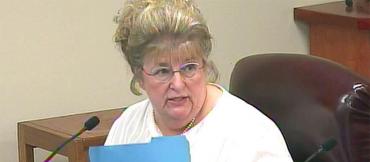
Siding with Gov. Ron DeSantis, the Florida Supreme Court unanimously ruled Tuesday that the governor acted within his authority when he suspended Okaloosa County Superintendent of Schools Mary Beth Jackson.
DeSantis stripped Jackson of her post less than a week after he was sworn into office, citing “scathing” grand-jury reports that alleged “dereliction of duty.”
Jackson’s suspension was based, in part, on allegations that a teacher abused developmentally challenged pre-kindergarten students at an elementary school during the 2015-2016 school year. Grand-jury reports alleged that Jackson, among other things, failed to implement proper procedures for reporting abuse to the Department of Children and Families and the Department of Education and failed to implement a proper procedure for removing teachers facing allegations involving the health or safety of students.
Jackson’s lawyer, George Levesque, argued the governor lacked the power to suspend Jackson because the alleged wrongdoing occurred before she was re-elected in 2016.
But in Tuesday’s ruling, the justices found that Jackson’s petition “is based on a faulty premise.”
The grand jury reports outlining Jackson’s alleged wrongdoing came out in 2018, “well into Jackson’s current term of office,” the justices wrote.
“The suspension order explains that those grand jury reports faulted Jackson’s longer-term response to allegations made during the 2015-2016 school year about a teacher’s abuse of special needs students,” the four-page opinion said.
According to the suspension order, the grand jury found “systemic failures in Jackson’s training and supervision of personnel,” especially in the areas of ethics, child abuse and mandatory reporting obligations, according to the opinion.
“The text of the suspension order leaves no doubt that, in the governor’s view, those failures continued up to the time of Jackson’s suspension in January 2019,” the justices wrote.
The ruling also noted that the court has a “limited role in reviewing the exercise of the suspension power,” which the Constitution “commits to the governor and which inherently involves ‘judgment and discretion,’ ” a point on which Justice Barbara Lagoa elaborated in a nine-page concurring opinion.
The state Constitution gives the Florida Senate the power to reinstate or remove elected officials from office. Jackson originally appealed her suspension to the Senate, but her appeal was put in abeyance after the ousted schools chief asked the Supreme Court to weigh in on the case.
The Constitution “expressly and unambiguously vests the governor with the power to suspend,” Lagoa wrote, echoing one of the arguments made by DeSantis’ lawyer, Nicholas Primrose.
“Assuming that the suspended officer falls into one of the constitutionally enumerated categories and that the governor has filed the executive order of suspension with the custodian of records, the plain language of the Constitution excludes the judiciary from involving itself in the suspension and removal process save for a limited exception,” Lagoa wrote.
The Supreme Court ruling puts Jackson’s fate back in the hands of the Senate with time running out before the legislative session is scheduled to end May 3.
In a memo to senators Tuesday evening, Senate President Bill Galvano, who appointed former state Rep. Dudley Goodlette to serve as special master in the case, said he instructed Goodlette “to immediately resume the Senate proceedings related to this suspension.”
Goodlette notified Levesque and Primrose that the Senate proceedings would continue and gave the lawyers until 5 p.m. Friday to submit a proposed schedule.
The Supreme Court decision could foreshadow how the court may rule in an appeal by suspended Broward County Sheriff Scott Israel, whom DeSantis also removed from office in January. The governor accused the sheriff of “neglect of duty” and “incompetence” related to two mass shootings in Broward County, including the February 2018 massacre at Marjory Stoneman Douglas High School that left 17 students and staff members dead and 17 others injured.
Israel, too, first appealed his suspension to the Senate, but later challenged DeSantis’ action in Broward County circuit court. Earlier this month, Broward County Circuit Judge David Haimes dismissed the case, ruling that DeSantis acted within his authority when he suspended Israel, who appealed that decision, The appeal is pending at the Supreme Court.
Israel’s lawyer, Benedict Kuehne, accused the Republican governor of “a political power play” that interfered with the public’s right to determine their elected officials and Israel’s right to execute his duties of office. But Haimes said the court’s ability to override DeSantis’ decision was limited to whether the executive order suspending Israel names “one or more grounds” laid out in the Constitution and “is supported with alleged facts sufficient to constitute the grounds named for the suspension.”


